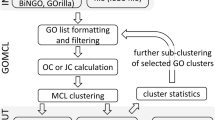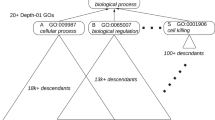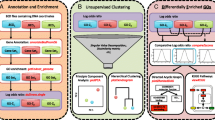Abstract
Biologists often use systems of ontologies to classify gene lists obtained by high-throughput gene or protein-sequencing instruments, and then enrichment scores were used to rank the ontology system. Therefore, the important molecular functional categories related to the phenotype can be conveniently viewed in the ontology system. Since the birth of GO (Gene Ontology) organization, various types of ontology software have been developed to calculate enrichment scores for the target gene list in the GO system. Herein, we provide an enrichment calculation application oppOntology (Omics Pilot Platform for Ontology) developed by MATLAB. oppOntology supports simultaneous calculation of multiple samples with manifold enrichment scores (GeneCount, GeneRatio, EnrichFactor, HypergeometricTest, and FisherExactTest). oppOntology can not only calculate enrichment scores for generic functional databases, such as GO, KEGG, HPO, and MsigDB, but also for self-defined functional category databases and customized GO Slim. Moreover, oppOntology supports online mapping of KEGG pathway diagrams in a batch way. The GUI (Graphical User Interface) of oppOntology is developed on the architecture of AppDesigner in MATLAB, and all input and output files are Microsoft Excel. oppOntology is an independent, easy-to-use enrichment calculation software, that can be available at https://github.com/HangZhouSheep/oppOntology.






Similar content being viewed by others
Data Availability
The program and full instruction of oppOntology was available at https://github.com/HangZhouSheep/oppOntology.
Abbreviations
- GO:
-
Gene Ontology
- DAVID:
-
Database for Annotation, Visualization and Integrated Discovery
- DEGs:
-
Differential Expressed Genes
- GSEA:
-
Gene Set Enrichment Analysis
- GUI:
-
Graphical User Interface
- HPO:
-
Human Phenotype Ontology
- KEGG:
-
Kyoto Encyclopedia of Genes and Genomes
- MsigDB:
-
Molecular Signatures Database
- OPP:
-
Omics Pilot Platform
- oppOntology:
-
Omics Pilot Platform for Ontology
- REST:
-
Representational State Transfer
- URL:
-
Uniform Resource Locator
References
Peng, J., Lu, G., Xue, H., Wang, T., & Shang, X. (2019). TS-GOEA: A web tool for tissue-specific gene set enrichment analysis based on gene ontology. BMC Bioinformatics, 20, 572. https://doi.org/10.1186/s12859-019-3125-6
da Huang, W., Sherman, B. T., & Lempicki, R. A. (2009). Systematic and integrative analysis of large gene lists using DAVID bioinformatics resources. Nature Protocols, 4, 44–57. https://doi.org/10.1038/nprot.2008.211
Zhou, Y., et al. (2019). Metascape provides a biologist-oriented resource for the analysis of systems-level datasets. Nature Communications, 10, 1523. https://doi.org/10.1038/s41467-019-09234-6
Rue-Albrecht, K., et al. (2016). GOexpress: An R/Bioconductor package for the identification and visualisation of robust gene ontology signatures through supervised learning of gene expression data. BMC Bioinformatics, 17, 126. https://doi.org/10.1186/s12859-016-0971-3
Manjang, K., Tripathi, S., Yli-Harja, O., Dehmer, M., & Emmert-Streib, F. (2020). Graph-based exploitation of gene ontology using GOxploreR for scrutinizing biological significance. Science and Reports, 10, 16672. https://doi.org/10.1038/s41598-020-73326-3
Waardenberg, A. J., Basset, S. D., Bouveret, R., & Harvey, R. P. (2015). CompGO: An R package for comparing and visualizing Gene Ontology enrichment differences between DNA binding experiments. BMC Bioinformatics, 16, 275. https://doi.org/10.1186/s12859-015-0701-2
Peng, J. et al. (2016). InteGO2: a web tool for measuring and visualizing gene semantic similarities using Gene Ontology. BMC Genomics. 17(5),530. https://doi.org/10.1186/s12864-016-2828-6
Zheng, J., Xiang, Z., Stoeckert, C. J., Jr., & He, Y. (2014). Ontodog: A web-based ontology community view generation tool. Bioinformatics, 30, 1340–1342. https://doi.org/10.1093/bioinformatics/btu008
Couch, D., et al. (2019). GAIL: An interactive webserver for inference and dynamic visualization of gene-gene associations based on gene ontology guided mining of biomedical literature. PLoS ONE, 14, e0219195. https://doi.org/10.1371/journal.pone.0219195
Kim, Y. A., Madan, S., & Przytycka, T. M. (2017). WeSME: Uncovering mutual exclusivity of cancer drivers and beyond. Bioinformatics, 33, 814–821. https://doi.org/10.1093/bioinformatics/btw242
Acknowledgements
We thank Dr. Yang Zhang for writing oppOntology independently. We are so grateful to the selfless help from the Shanghai Huisen Science & Technology Company for oppOntology maintenance.
Funding
This research was supported by the National Key R&D Program of China (2021YFF0703702) and the National Nature Science Foundation of China (32070605).
Author information
Authors and Affiliations
Contributions
Conception and design: Shengyang Ge and Yang Zhang.
Administrative support: Chuanyu Sun and Yang Zhang
Collection and assembly of data: Yang Zhang and Yi-fan Tan
Data analysis and interpretation: Yang Zhang and Zening Wang
Program writing: Yang Zhang
Manuscript writing: all authors
Final approval of manuscript: all authors
Corresponding authors
Ethics declarations
Ethics Approval
Not applicable.
Consent for Publication
Not applicable.
Competing Interests
The authors declare no competing interests.
Additional information
Publisher's Note
Springer Nature remains neutral with regard to jurisdictional claims in published maps and institutional affiliations.
Rights and permissions
Springer Nature or its licensor holds exclusive rights to this article under a publishing agreement with the author(s) or other rightsholder(s); author self-archiving of the accepted manuscript version of this article is solely governed by the terms of such publishing agreement and applicable law.
About this article
Cite this article
Ge, Sy., Wang, Zn., Sun, Cy. et al. oppOntology: a MATLAB Toolbox for Enrichment Analysis. Appl Biochem Biotechnol 195, 832–843 (2023). https://doi.org/10.1007/s12010-022-04170-6
Accepted:
Published:
Issue Date:
DOI: https://doi.org/10.1007/s12010-022-04170-6




